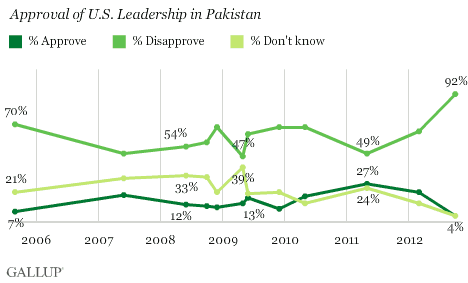During John Brennan’s Senate confirmation hearings last week, Senator Susan Collins asked him about whether the drone strikes in Pakistan are “creating a backlash” and “creating new terrorists when a neighbor or family member is killed in the course of the operations.” She cited statements to that effect from General Stanley McChrystal and former CIA Director Michael Hayden.
In response, Brennan demurred, insisting that “we, in fact, have found in many areas is that the people are being held hostage to al-Qa’ida in these areas and have welcomed the work that the U.S. Government has done with their governments to rid them of the al-Qa’ida cancer that exists.”
According to a new Gallup poll, more than nine out of ten Pakistanis (92%) disapprove of US leadership. Only 4% approve, “the lowest approval rating Pakistanis have ever given.”

Which of the 92% of Pakistanis that disapprove of US leadership does Brennan believe are “welcoming” of the drone war?
The reality is that this disapproval rating is largely a result of the fact that Washington has been bombing their country for about 10 years, with up to 364 strikes and 3,000 people killed.
A study last year by researchers at the Stanford and NYU schools of law found that the drone program is “terrorizing” the people of Pakistan and that it is having “counterproductive” effects in the population.
“Evidence suggests that US strikes have facilitated recruitment to violent non-state armed groups, and motivated further violent attacks,” the study said. “As the New York Times has reported, ‘drones have replaced Guantánamo as the recruiting tool of choice for militants.’ Drone strikes have also soured many Pakistanis on cooperation with the US and undermined US-Pakistani relations. One major study shows that 74% of Pakistanis now consider the US an enemy.”
This goes not just for Pakistan, but for Yemen too. According to The Washington Post, drone strikes are not “welcomed” by the population, as Brennan claims, but serve to radicalize the population against America.
“The evidence of radicalization emerged in more than 20 interviews with tribal leaders, victims’ relatives, human rights activists and officials from four provinces in southern Yemen where U.S. strikes have targeted suspected militants,” the Post reported. “They described a strong shift in sentiment toward militants affiliated with the transnational network’s most active wing, al-Qaeda in the Arabian Peninsula, or AQAP.”
“We have gone a long way down the road of creating a situation where we are creating more enemies than we are removing from the battlefield. We are already there with regards to Pakistan and Afghanistan,” said Robert Grenier, who headed the CIA’s counter-terrorism center and was previously a CIA station chief in Pakistan.
Brennan is living in a fantasy land.




look at that 2009, a visual representation of hope being crushed.
It looks like this graph is saying… YAY Imran Khan.. YAY!! BOO Barak Obama …BOO!! of popular opinions in Pakistan…
This cancer that insists on growing, this tumor whose nodes sprout when others are cut off, this monster that needs to be eradicated is imperial US and its bastard Israel.
Data plans and phones that provide excellent video quality are good for people who have long daily communities, allowing them to watch newscasts or to be entertained on the train. click link
When the lead country of the free world believes it has the right to vioilate the sovereignty of any other state that poses some threat, all the advances in international politics of the past 50 years have been lost. It is obvious that Israel also claims the right to violate the sovereignty of Lebanon, Syria, Iraq and any other country that they consider a potential threat. Who are the rouge nations of the world?
The military industrial complex wants the natives to be angry. Cold blooded invaders do not Care about little people. Joe average simply gets in the way of the "mission" and the "mission" is everything.
Politicians and generals lie as they had been never in this region. This is absurd we will approve drone attacks in which innocent people are killed and mostly children and women. CIA can try in america with drone attacks and kill few americans then ask whether they love drones or not. non sense.
Does anybody think Brennan cares?
This cancer that insists on growing, this tumor whose nodes sprout when others are cut off, this monster that needs to be eradicated is imperial US and its bastard Israel.
The Pakistan Military is a joke. They have allowed over 400 strikes on their terroritory without ever shooting one down. You read all the time how these drones just hover for hours in the sky and the Pakistani Military is AWOL. Either incompetent or complicit.
The military industrial complex wants the natives to be angry. Cold blooded invaders do not Care about little people. Joe average simply gets in the way of the "mission" and the "mission" is everything.
Wars create money. and they are a way for politicians to survive. But dont understand Pakistanis at all. Why the Heck dont they shoot them down??
Strange Americans :S
This cancer that insists on growing, this tumor whose nodes sprout when others are cut off, this monster that needs to be eradicated is imperial US and its bastard Israel.